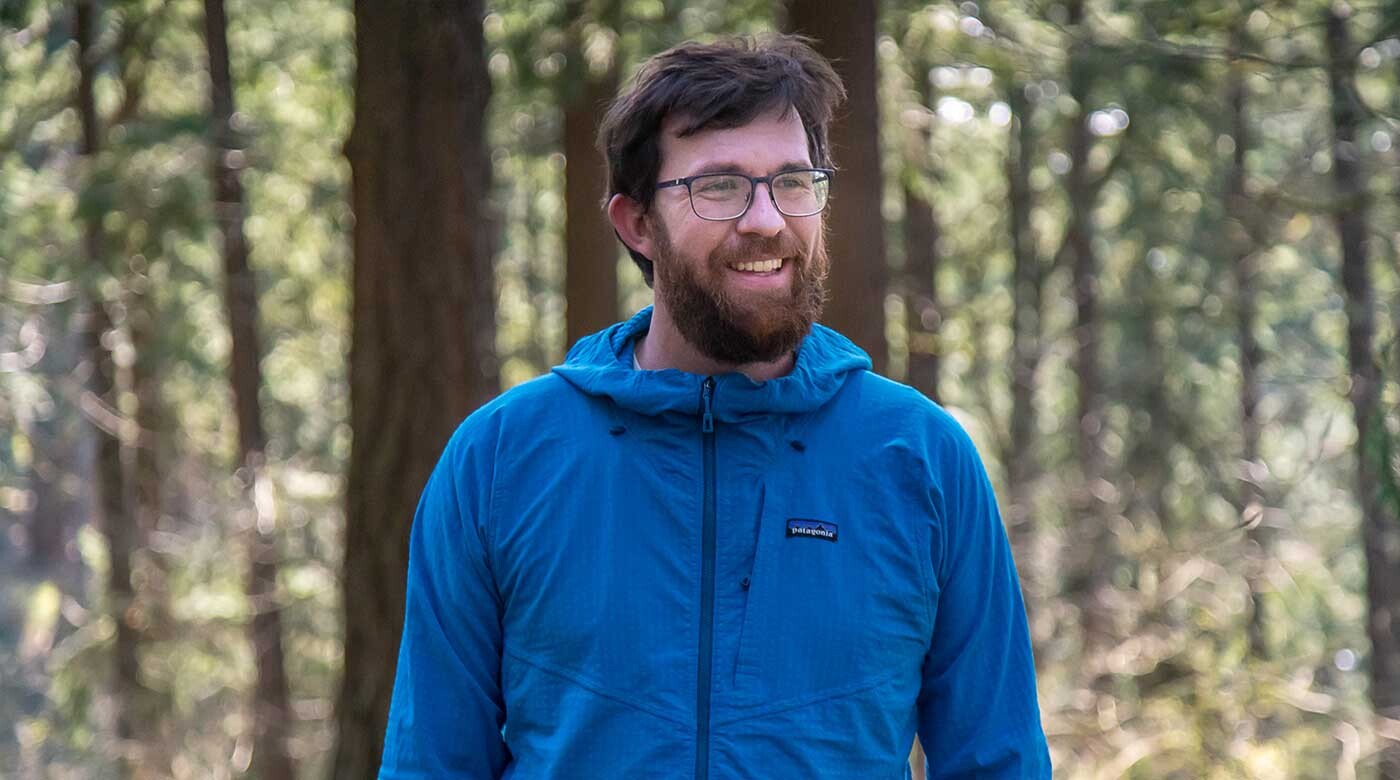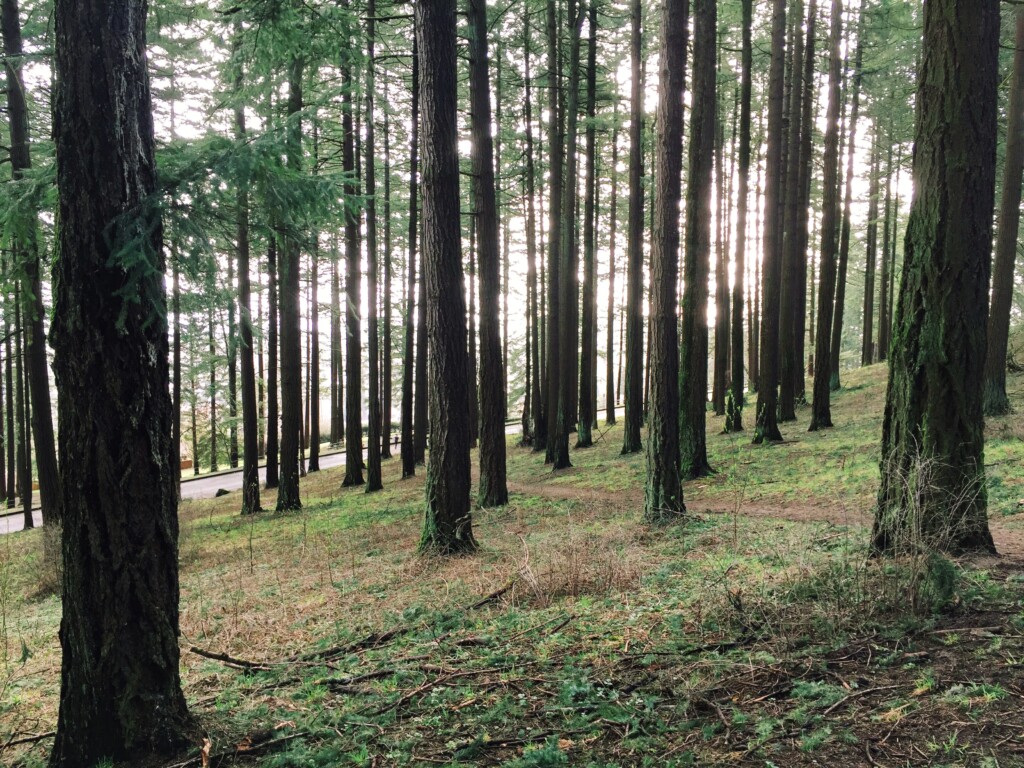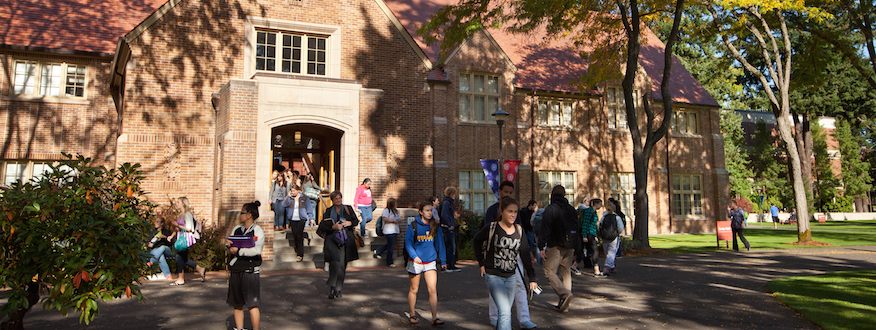Andrew Schwartz’s journey from PLU sociology major to environmental justice advocate and eco-ministry leader

Image: Andrew Schwartz ’07, the director of sustainability and global affairs at The Center for Earth Ethics, walks through Mount Tabor Park in Portland, Oregon. (photos and video by Silong Chhun/PLU)
By Lora Shinn
PLU Marketing and Communications Guest Writer
When we first catch up with environmental advocate Andrew Schwartz ‘07, he's preparing for a massive road trip with his wife, Emily, and 8-month-old daughter, Maja. They're headed east to visit Emily's family in Illinois. But the 36-year-old Schwartz's life has also been a journey, of sorts, from suburban Oregon to changemaking on the global scale—with a few stops along the way—fueled by hope and faith.
Schwartz grew up in Corvallis, Oregon. His mother, Elaine, attended PLU, as did his grandfather and grandmother on his mother’s side (Rudy and Ruth Johnson). His grandfather went on to become a Lutheran pastor, while his grandmother was an organist and pianist for the church.
In 2003, Schwartz enrolled at Pacific Lutheran University. PLU’s Parkland location helped open Schwartz’s eyes beyond his white, middle-class upbringing in Corvallis. The school is an academic institution with a lived intention to give back to community, he says, and exemplified how nothing exists in isolation. “For an ecosystem to survive, everything needs to thrive,” he says. “Being here isn’t enough—we need to improve life for everyone around us, too.” While at PLU, Schwartz worked at the Boys and Girls Club, and was a big buddy at nearby James Sales Elementary school.
Schwartz majored in sociology at PLU, and in classes with professors like Dick Jobst and Anna Leon Guerrero, he was asked challenging questions, and examined systems of oppression, discrimination, and racism. Like nesting dolls in reverse, he saw how vast the world’s systems could be. “I didn’t have either experience or language for those things, so the experience was revolutionary,” he says. “PLU is a great place to ask questions.”
In Schwartz’s senior year, he faced new challenges and became deeply familiar with physical and emotional pain after herniating discs in his lower back. Bedridden for a month, the healing process was slow. He started spring quarter later than others, and at times, he’d have to lay down in class in the back row. Depressed and struggling, he managed with the assistance of supportive teachers, including Guerrero.
For his Capstone project, Schwartz studied the sociology of religion. He realized the commonality of contemplative questions—what does it mean to be alive? Why are we here? Why do we believe the things we believe?
“For me, as I learned more, I questioned more,” he says. “PLU helped me begin to understand questions that needed to be asked, which helps you ask better questions next time, and be OK when answers are messy or nonexistent.”
From PLU to Planetary Change
After graduating from PLU in 2007, Schwartz held a collection of jobs including working in janitorial services, data entry at a nonprofit, and environmental remediation work on houses. In 2010, he entered Union Theological Seminary, in New York City. He thought he’d become a Lutheran pastor. But by the second week, he wasn’t sure he wanted to stay on. Faculty members encouraged him to stay, advocating for the philosophical and life experiences resulting from seminary school.
In 2012, Schwartz was a youth representative to the United Nations Rio+20 Conference in Brazil. “It was a remarkable experience being in Rio with folks from around the world,” he says. Yet, it was also a wake-up call, of sorts. “It was incredibly revealing that an entire auditorium of people, all deeply aware of the current and imminent impacts of climate change, chose not to take bold action because it wasn’t politically or economically convenient.” He realized that the climate conversation is really about deeper values.
In 2013, he graduated with his master’s in divinity. In 2014, Karenna Gore and Schwartz, both Union Theological Seminary graduates, worked together on a grant for climate week’s interfaith gathering, called Religions for Earth conference. The conference drew more than 200 faith leaders, NGOs, nonprofits, UN representatives, environmental justice organizations, and more.
That conference bloomed into The Center for Earth Ethics (CEE) at Union Theological Seminary. CEE is an international innovator in the eco-ministry field, facilitating spiritual and religious action on environmental and climate justice. It doesn’t just rely on religious foundations, however. The center engages secular and faith-based environmental leaders for education, outreach, support, and action. CEE is creating “incredible spaces where people from all walks of life come together for problems and solutions, while cultivating beauty and a sense of community,” he says. “It keeps me coming back to embrace the struggle.”
The organization offers a moral response to the ecological destruction that accompanies climate change’s threats, particularly to vulnerable, frontline, and marginalized communities, Schwartz says. “So much of climate change is driven by science and research, without putting people, community and culture at the forefront. There are human impacts of climate change that need to have their story heard and represented.”
Schwartz notes that nearly 70% of Black people live or have lived within 30 miles of coal plants. “That’s not by accident, but due to racism in America,” he says. Addressing that racism while cleaning and improving the environment is what centers Andrew’s work—even as horror, tragedy and grief are involved, too. Being rooted in community and sense of purpose helps him see beyond the immediacy of the 30-year-window for change.
Work with Meaning
As the director of sustainability and global affairs at CEE, Schwartz runs conferences and educational presentations, including classes, trainings and workshops, along with annual training of ministers, which focuses on one aspect of climate change such as food or water. “Faith engenders purpose and conviction regardless of faith identity, and imbues action with meaning,” he says. CEE participants may be Muslim, Jewish, Hindu, Catholic, or indigenous faith leaders, all driven by purpose to provide love, care, and hope in the world, he observes.
There are some differences in how faiths view the environment. For example, while Christians may feel humans should steward the land, other faiths believe the land stewards humans, Schwartz explains. Faith and wisdom traditions offer ways to deal with suffering and pain and the “deep agony of what it means to be alive, and finding tremendous beauty, comfort, friendship and love on the other side,” he says. “Seeing a different perspective opens my eyes to the work that can and should be done.”
He’s attended meetings that fell apart due to the power of truth-telling. It can be tough to sit with the brokenness of the moment, he says. One story illustrates his point. Bernadette Demientieff, executive director of the Gwich’in Steering Committee, spoke at a conference about the depths of her pain as Arctic ice melted, food insecurity spread, and caribou disappeared.
“It still haunts me,” he says. “And then you sit down with Bernadette and she talks about her kids and grandkids as reasons for why she fights, and why she has to have hope. That’s what sustains me. Climate change work is a very tragic love story, where you fight hard because you love so much.”
Shannon M. D. Smith, Center for Earth Ethics’s communication manager, has worked with Schwartz for four years. His work is encouraging and inspiring, she says. “He has grown seeds both metaphorically and literally to emerge in this moment,” Smith says. “Calling our attention to plants, agriculture, food systems and the interconnectedness with other systems of extraction and oppression.”
“I think we’re all excited to see where and how Andrew’s contributions to these conversations will have a long-standing impact,” she says. “Whether that’s in a local community framework or a global dialogue, all our voices can make a difference.”

Faith as Sustenance
Schwartz is still a nominal member of the Lutheran church and feels culturally Christian due to his Lutheran upbringing and Christ-informed values. But his work is grounded in faith communities, which helps alleviate the burnout and cynicism common among those engaged in climate-change mitigation and among environmentalists, he says.
“It’s hard work staring at the abyss every day and feeling the enormity of the failure to act, and seeing real, lived impacts on peoples devastated by climate change,” he says. “There’s an unwillingness to act, and climate change is perpetuated by greed and consumerism.”
These aspects can be difficult to hold, without retreating into bitterness, anger, and despair. But environmental work has a positive impact and can motivate and compel changes, even if in small ripples, at first.
“Finding power in love really does inform and help me deal with dark moments,” he says. He cites a favorite Cornel West quote: “I cannot be an optimist but I am a prisoner of hope.”
“Now that I have Maja, every date in the future has her face on it,” Schwartz says. As an example, he points to 2030 as a huge year in climate change. Will a 10-year-old Maja be able to enjoy the outdoor experiences Schwartz enjoyed as a child—riding bikes and playing outside?
For new PLU graduates, Schwartz suggests equal doses of patience and curiosity. As he found through his own journey, there may be twists and turns, but the ability to ask questions can enable seekers to keep the faith, in a multitude of ways.
“Don’t assume that path you start on is one you end on, and always be ready to say yes even if it’s scary, or doesn’t work out.”
To learn more about how you can support PLU students visit plu.edu/advancement.



